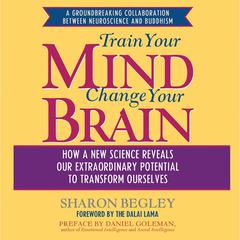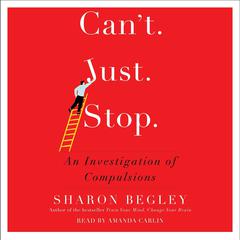 Play Audiobook Sample
Play Audiobook Sample
Train Your Mind, Change Your Brain (Abridged): How a New Science Reveals Our Extraordinary Potential to Transform Ourselves Audiobook
 Play Audiobook Sample
Play Audiobook Sample
Quick Stats About this Audiobook
Total Audiobook Chapters:
Longest Chapter Length:
Shortest Chapter Length:
Average Chapter Length:
Audiobooks by this Author:
Publisher Description
Is change possible? Everyone who has tried and failed, wished they could be happier, or has been told they were too old to learn something, has wondered why we just seem to be stuck with ourselves. But this amazing and hopeful audiobook shows us that it is not only possible for us to control our brains but also for us to rewire them. In late 2004, the Mind and Life Institute brought Western Scientists together with the Dalai Lama and other distinguished Buddhist masters to discuss the cutting edge research being conducted in neuroplasticity, which examines whether neurons can be changed and even grown. The findings are as astonishing as they are helpful. Flying in the face of previous assumptions, the current research shows that not only is it possible for us to change the physical brain, but it is within reach of every single one of us. Through research into neuroplasticity, it has been shown that we can: • Reset our happiness meter • Heal from depression, even major episodes • Learn new skills even in old age • Learn—and even teach—compassion, a critical finding for personal happiness and a more peaceful world Surprising, encouraging, and full of good news that we all want to hear, Sharon Begley's Train Your Mind, Change Your Brain will help us not only change our brains but also the way we approach our lives—for the better.
Download and start listening now!
"The discovery of neuroplasicity - the ability of our brains to keep changing and growing - to alter it's structure and function and that nothing about our brain is set in concrete.This book intergrates wonderfully, cutting edge science with the ancient wisdom of Buddhism "
— Ron (4 out of 5 stars)
Quotes
-
The Dalai Lama, Buddhist monks and some of the world's leading neuroscientists all gather once a year at a conference on the latest discoveries in neuroplasticity: the study of how the human brain can change itself. ...his remarkable conference serves as the center of Wall Street Journal science columnist Begley's account of neuroplasticity.
— Publishers Weekly
Train Your Mind, Change Your Brain Listener Reviews
-
" Liked it, but definitely for the scientifically minded. Learned a lot about Buddhism that I never knew (I'm quite impressed actually) - and a LOT about how moldable our brain, and therefore, our mind, is. Fascinating stuff. "
— Myra, 2/8/2014 -
" Good one. But pure science "
— bubblesm, 1/25/2014 -
" It's never too late to improve your mind and exercising your body as well as your mind will keep you youthful. "
— Marsha, 1/24/2014 -
" Understandable neuroscience for the layperson with enough science that I feel like I learned something by the end. You can tell Begley was a journalist, too: direct, clear, and concise. "
— Martac, 1/18/2014 -
" Probably should be a five but my brain is apparently not big enough to absorb it all! Interesting...Dalai Lama and neuroscience coming together "
— Susan, 1/11/2014 -
" I'm in a brain book stage right now. And am very glad to know that middle-aged dogs can learn new tricks. "
— Nancy, 12/4/2013 -
" This book is an accessible explication of the theory of neuroplasticity....if trauma can negatively impact your brain structure and chemistry , then we can likewise engineer positive circumstances thru salutory mind=body events that will have benefits for the brain and mind. "
— Janice, 12/3/2013 -
" Very valuable read for anyone who thinks about thinking. "
— Larry, 11/18/2013 -
" I liked it, I found it very interesting but it was redundant at times and a little long. I'm a vegan and never enjoy reading stories about animal research as it seems inhumane to me. "
— Kathy, 11/15/2013 -
" some chapters were harder to read but this is a fascinating peak into how all of us (not just children) are constantly evolving our brains and what is the brain versus the mind. Enough to get one to join a Buddhist meditation group "
— Rorie, 11/1/2013 -
" Very good journalistic introduction to neuroplasticity. "
— Christopher, 9/6/2013 -
" Opened my mind about the ability to re-program and rework the brain. Bit clinical but informative nonetheless. "
— Dbdanvers, 5/29/2012 -
" Fascinating science presented in an awkward format. Nice reference. "
— Brandon, 11/21/2011 -
" I expectwd thos to better. The most interesting part is the comparison of neuroplasticity with buddhist teachings. "
— Sarah, 6/19/2011 -
" After working through some dry scientific jargon, I sank into this book. It reinforces what I already believe, that meditation can transform us. The author closed with the idea that some day physicians may be recommending meditation, not just the Dalai Lama. "
— Margaret, 5/14/2011 -
" Read this in my book group. Some interesting insights. Popularized explanation of synapses, etc. Too long to get to the point of the book. Don't tell me what you are going to show me, just show it to me. "
— Conrad, 3/3/2011 -
" This book is much more "history of" than "how- to". "
— Royce, 2/18/2011 -
" I'm in a brain book stage right now. And am very glad to know that middle-aged dogs can learn new tricks. "
— Nancy, 10/1/2010 -
" This was the most engaging and interesting non-fiction book I've read to date. "
— Moira, 8/1/2010 -
" some chapters were harder to read but this is a fascinating peak into how all of us (not just children) are constantly evolving our brains and what is the brain versus the mind. Enough to get one to join a Buddhist meditation group "
— Rorie, 5/17/2010 -
" Yes, thinking is hard, but if we can scientifically measure brain centers than why can't we harness this energy to truly light the bulbs. That would make me useful. "
— Eric, 1/27/2010
About Eliza Foss
Eliza Foss is an actress who has appeared in numerous theaters in New York City and around the country. She has narrated over thirty books and short stories, been featured in AudioFile magazine, and won five AudioFile Earphones Awards for her narrations.






